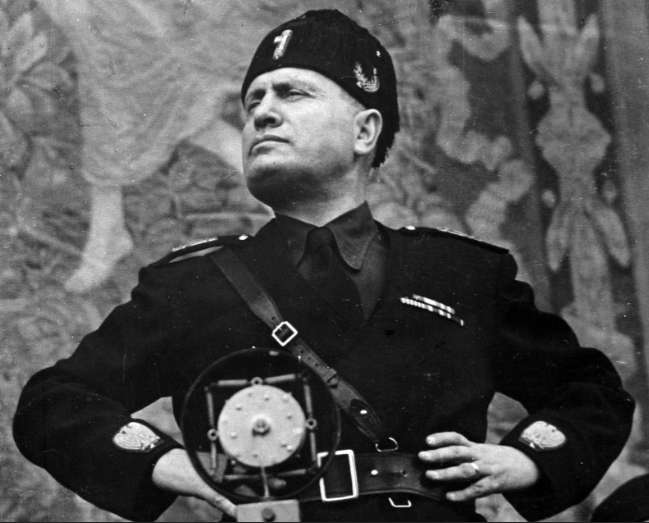The accusation of “fascist!” is being tossed around a lot in the closing weeks of this campaign season, which gets me to wondering if these accusers actually know what fascism is. It’s a hard thing to pin down because fascist governments only existed for a very brief flash in the historical pan and only in a few countries. And most of what folks think of when hearing the term is the peculiar leaders of these governments and the antisemitic atrocities of the Nazis. But what were the actual philosophical underpinnings for fascism and what were the mechanics upon which fascist governments operated?
Since he coined the term and established the first fascist government in Italy, it’s fair to look at Benito Mussolini’s definitions of what fascism is for clarity. His most famous quote on the subject is, “Everything in the State, nothing outside the State, nothing against the State.” In today’s terms, that could be translated as the political class determines the narrative and policy direction, everyone better agree, and nobody who questions or opposes it will be tolerated.
Further, in his “The Doctrine of Fascism” (1932) Mussolini defined it “as an organized, centralized, authoritarian democracy.” Notice how he sees “authoritarian” and “democracy” as linked concepts, which is why those who value individual freedom and rights are fond of pointing out that the USA is a not a democracy, but a republic. The tyranny of the majority is still a tyranny. It’s an important distinction.
Speaking of individual rights, Mussolini wrote, “If the 19th century was the century of the individual ([classical] liberalism implies individualism), we are free to believe that this is the “collective” century, and therefore the century of the State.” He summed that up more succinctly later with, “If [classical] liberalism spells individualism, Fascism spells government.” Hmmm.
So, at its core, a fascist regime is one that embraces the centralized authority of the State, is collectivist in nature, and rejects the role of government as a protector of individual rights and individual agency in favor of State-determined, State-directed outcomes.
Understood from this perspective, the ultimate anti-fascist document is the US Constitution, which limits governmental power and decentralizes that power through checks and balances such as states’ rights, our three branches of government, bicameral legislature, electoral college, etc., and our Bill of Rights that ensures individual rights take primacy, and government’s role is to protect and preserve those rights. So, when you see some in our country today who want to dismantle those institutional checks and balances by, say, packing the court, eliminating the electoral college, promoting a stronger, more centralized government power at the expense of states, and pushing policies that place government-directed, collective outcomes over individual rights, it’s safe to say Mussolini would approve.
It’s important to remember that fascism in the second quarter of the 20th century was an outgrowth of the Progressive movement of the first quarter. (For example, Hitler really liked Margaret Sanger’s positions on eugenics!) Early 20th-century Progressive philosophers inspired fascist politicians with ideas like “human nature could be improved through the enlightened application of regulations, incentives, and punishments. The second key assumption was that the federal government’s power could be harnessed to improve the individual and transform society” (Kahn Academy). It’s a tempting concept. It just never works and always ends very badly.
But, we still have politicians today who are inspired by the notion that it is their role to harness government to transform society and are fond of applying government “regulations, incentives, and punishments” to achieve outcomes that are at odds with the choices individuals would make if left free to our own devices? Off the top of my head, where would, say, The Unaffordable Heat Act fall on this spectrum? Or Clean Cars II that bans the sale of internal combustion engine vehicles in order to achieve the State objective of transportation electrification? What would Mussolini say?
Mussolini did say, “The Fascist State expresses the will to exercise power and to command.” Or in other words, the government knows what’s best for you, and you will obey the government.
Which gets us to enforcement under fascist rule. Mussolini describes “the severity which has to be exercised towards those who would oppose this spontaneous and inevitable movement of 20th century Italy [fascism] by agitating outgrown ideologies of the 19th century [classical liberalism], ideologies rejected wherever great experiments in political and social transformations are being dared.” In other words, Mussolini would definitely be an eager proponent of “cancel culture” today, deplatforming, demonetizing, and ostracizing those who disagree with the State approved narratives and policies. He would certainly approve of the lawfare being prosecuted against people like Elon Musk now that he is no longer “in the state” promoting the State goal of vehicle electrification and is “out of the state” advocating for individual rights of freedom of speech and exercising his own to oppose State endorsed policies.
As for Hitler and the Nazis, they were all on board with this kind of government, too, but added their own political twist of Aryan supremacy paired with virulent anti-semitism. But thank goodness we will Never Forget where that led, and no modern political movement – even one committed to transforming society via an “organized, centralized democracy” — would ignore, apologize for, or even embrace members who pour into public spaces and universities to rally, sometimes violently, around genocidal chants to kill the Jews…. Oh, wait.
